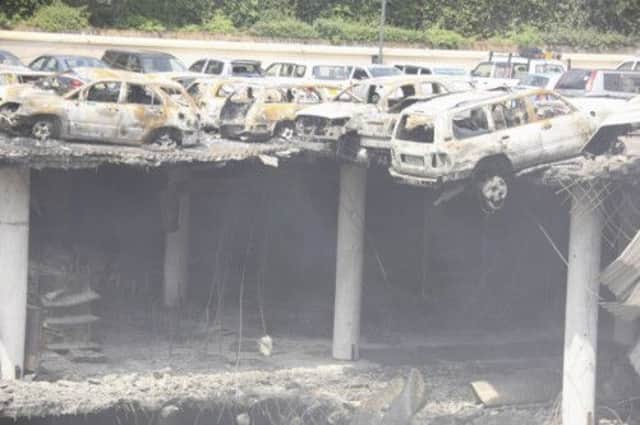Kenya: Troops, not terrorists, caused blasts


Confirmation came from an official yesterday, as the country’s interior minister announced eight people were being held in connection with the attack, while three others had been released.
A top-ranking government official, when asked if military action against Islamic extremists inside the building had caused the collapse, answered: “Yes.”
Advertisement
Hide AdAdvertisement
Hide AdHe also confirmed Kenyan troops had fired rocket-propelled grenades (RPGs) inside the mall, but would not say if that caused the collapse.
However, his comments seem to confirm earlier reports that RPGs were to blame for a gaping hole in the building’s roof.
On Monday, four huge explosions rocked the mall, causing a huge plume of dark smoke, at about the time the floors are thought to have collapsed.
The Nairobi government has not publicly explained what caused the collapse, although one official previously suggested it had been caused by a mattress fire inside the Nakumatt department store.
It is believed the collapse of the floors helped to bring an end to the four-day siege, but it may also have killed hostages still inside.
Some funerals have already been held, and post-mortems are due to be carried out on bodies recovered from the rubble to try to establish if those people died in the building collapse or had been killed earlier by the terrorists.
The Kenyan Red Cross says 61 people remain missing and concerns have been raised that their bodies may be buried in the destroyed part of the mall. The government says few victims are believed to be still inside.
It will take investigators at least seven days to comb through the rubble.
Advertisement
Hide AdAdvertisement
Hide AdIt has been claimed that the extremists hired a shop unit at the mall in the months leading up to the attack.
Senior security sources said this gave them access to service lifts at the Westgate centre, enabling them to stockpile weapons and ammunition.
Investigators have recovered a vehicle believed to have been used by the terrorists. Officials are also building a profile of a man who warned a pregnant woman at the mall to flee for her own safety, moments before last Saturday’s attack.
Amid the possibility that some terrorists escaped during the mass evacuation of civilians, Kenyan authorities have increased surveillance at border crossings and at Nairobi airport.
Security chiefs have been summoned to appear before parliament’s defence committee for questioning over the siege, and to account for the way in which it was conducted.
The al-Qaeda-linked Somali Islamic extremist group al-Shabaab has claimed responsibility for the attack, saying Kenya was a legitimate target because it sent its troops into Somalia to fight the militants.
The terrorists have since suggested the Nairobi attack would be followed by other similar actions.
Kenyan interior minister Ole Lenku repeated his government’s determination not to pull out of Somalia, saying it was a mission of “national security”.
Advertisement
Hide AdAdvertisement
Hide AdSpeaking during a news briefing, he said the eight suspects who had been arrested were being held under anti-terrorism laws, meaning they could be held “for longer periods before being arraigned in court”.
Robert F Godec, the American ambassador to Kenya, said the United States was concerned about the spectre of more violence from al-Shabaab.
He said: “Obviously they do pose a threat and it’s critically important, I think, that we understand al-Shabaab, understand what the terrorists in that organisation are up to, how they carry out attacks and really seek to frankly end the threat that the organisation poses.”